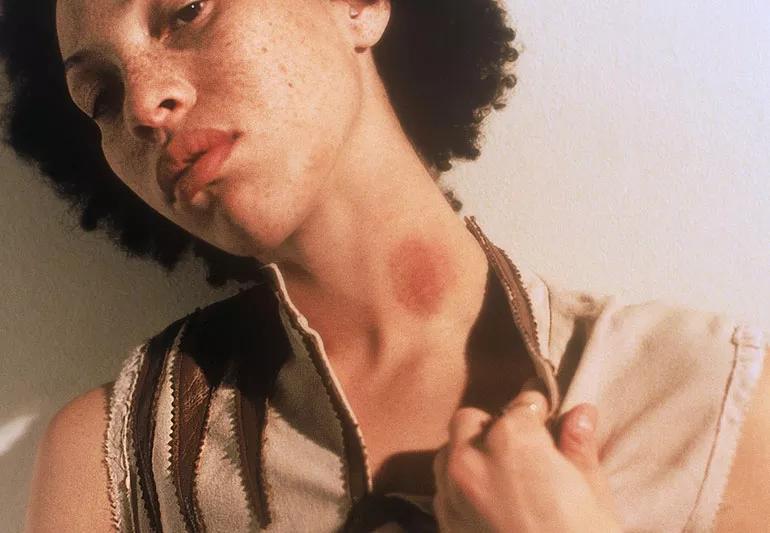This type of bruise might benefit from warm compresses, but time is really the healing key

You got a little hot and heavy in the heat of the moment, and now, there’s evidence of it for all to see — right there on your neck.
Advertisement
Cleveland Clinic is a non-profit academic medical center. Advertising on our site helps support our mission. We do not endorse non-Cleveland Clinic products or services. Policy
A hickey is a bruise caused by trauma to the skin, such as by sucking or biting. And although they aren’t serious injuries, they can be pretty embarrassing! So, how can you get rid of a hickey ASAP?
Dermatologist Alok Vij, MD, explains how to minimize a hickey while you wait for it to fully fade.
The internet is full of DIY tips that claim to get rid of hickeys overnight. But you shouldn’t rush to scrape your hickey with a fork or put toothpaste on your superficial wound, for example, in the hopes it’ll make your hickey disappear faster. Dr. Vij says there’s no real science to most of these tricks, and you can actually do more harm than good if you scrape, puncture or irritate the surface of your skin where it’s been bruised.
“A hickey is a stain in the second layer of the skin, called the dermis,” explains Dr. Vij. “Any abrasive treatment of the skin like scrubbing with toothpaste or trying to scratch off the discoloration would be too superficial to impact the hickey. And it could even make the problem more apparent with scratches, bleeding, additional discoloration and scar formation.”
Instead, Dr. Vij shares his top tips for minimizing your hickey’s appearance as it heals.
Your best bet is to treat your hickey with good old-fashioned warm compresses.
Advertisement
“Warm compresses can help open up your body’s blood vessels and break down the stain, taking away the red blood cells that have spilled out from the blood vessels and into your skin,” he explains.
You can do the following method as many as four times a day throughout the duration of your hickey:
Although cold compresses can help in cases of more substantial bruising, don’t bother putting them on your hickey unless it’s in the first few minutes after you get one. Icing your love bite immediately can provide minimal relief for irritation or inflammation, but it won’t help in the same way it would if you bruised your leg after bumping into the nightstand.
“The trauma to your skin is minimal enough that cold won’t do much good,” Dr. Vij says.
Instead, jump right to warm compresses and repeat as necessary for as many days as it takes for the mark to fade.
In addition to the warm compress method, you can apply gels or creams that contain the following ingredients to help speed up the healing process:
Some sources suggest applying aloe vera, which can calm skin inflammation (as in the case of sunburns), but Dr. Vij says it’s not actually much help on hickeys.
“With a hickey, there’s not that much skin inflammation,” he says. “It’s just slight trauma.”
If you have a big event coming up, you can ask your doctor about laser removal for a hickey in the 24 to 48 hours after it first appears. Be warned, though, that this method can be an expensive route, and it will still take a day or two for it to heal completely. Beyond that, your best bet is to wait out the healing process.
Advertisement
While you wait for your hickey to heal, if you want to cover up the evidence, you can rely on the following:
Of course, there’s another option: You don’t have to cover up your hickey if you feel safe leaving it uncovered. You shouldn’t feel ashamed or buckle under the weight of self-blame when it comes to relationships and sexual activity — instead, consider embracing sex positivity.
If you’re still trying to figure out how to get rid of a hickey fast, the truth sucks (hickey pun intended): There’s no quick and easy way to get rid of a hickey. Like other forms of bruising, hickeys need time to heal. So, you likely won’t be able to get rid of your hickey overnight let alone in a few hours.
But there’s good news. Most bruises last anywhere from three days to two weeks. Hickeys are a superficial form of bruising, so they don’t take as long to heal as other types.
“The amount of trauma to the skin that creates a hickey isn’t as great as the trauma that causes, say, a black eye,” reiterates Dr. Vij. “So, hickeys can heal earlier on the spectrum as compared to other causes of bruising.”
Advertisement

Sign up for our Health Essentials emails for expert guidance on nutrition, fitness, sleep, skin care and more.
Learn more about our editorial process.
Advertisement

Although it could be used as a moisturizer, this new trend is not recommended

It’s a great disinfectant for around your home, but not for your skin

Changes in texture, smell, color and performance are signs it’s time to throw the cosmetic item away

Strengthening your skin barrier, simple routines and minimizing products are ongoing, popular trends

Moisturizing, running a humidifier and adjusting your showers may help keep itchiness and irritation at bay

Glycolic acid benefits skin tone, texture and pigmentation by exfoliating dead skin

Some gentle soap and warm water go a long way when you’re washing these cosmetic tools regularly

New formulas are less drying and contain water-based and skin-loving ingredients

Even small moments of time outdoors can help reduce stress, boost mood and restore a sense of calm

A correct prescription helps your eyes see clearly — but as natural changes occur, you may need stronger or different eyeglasses

Both are medical emergencies, but they are very distinct events with different causes